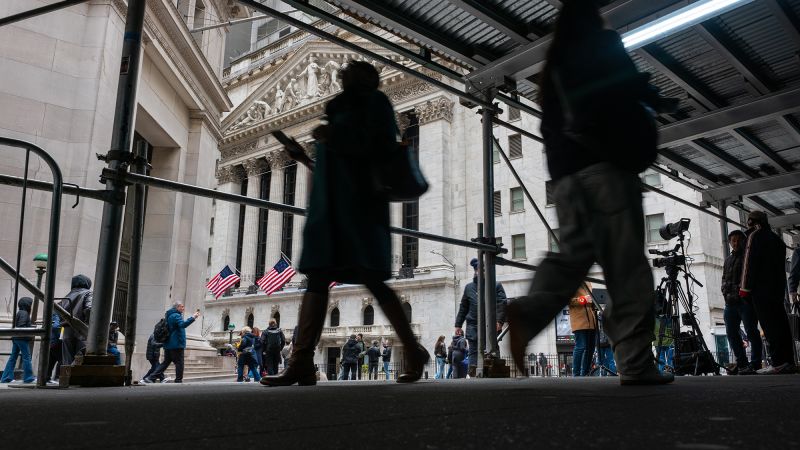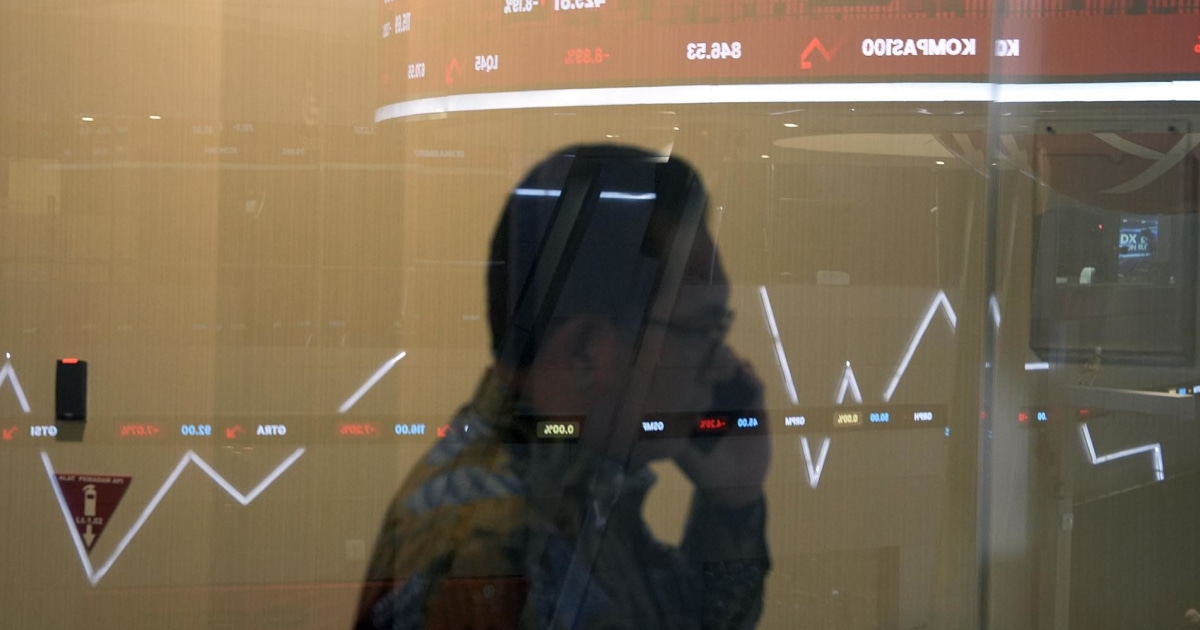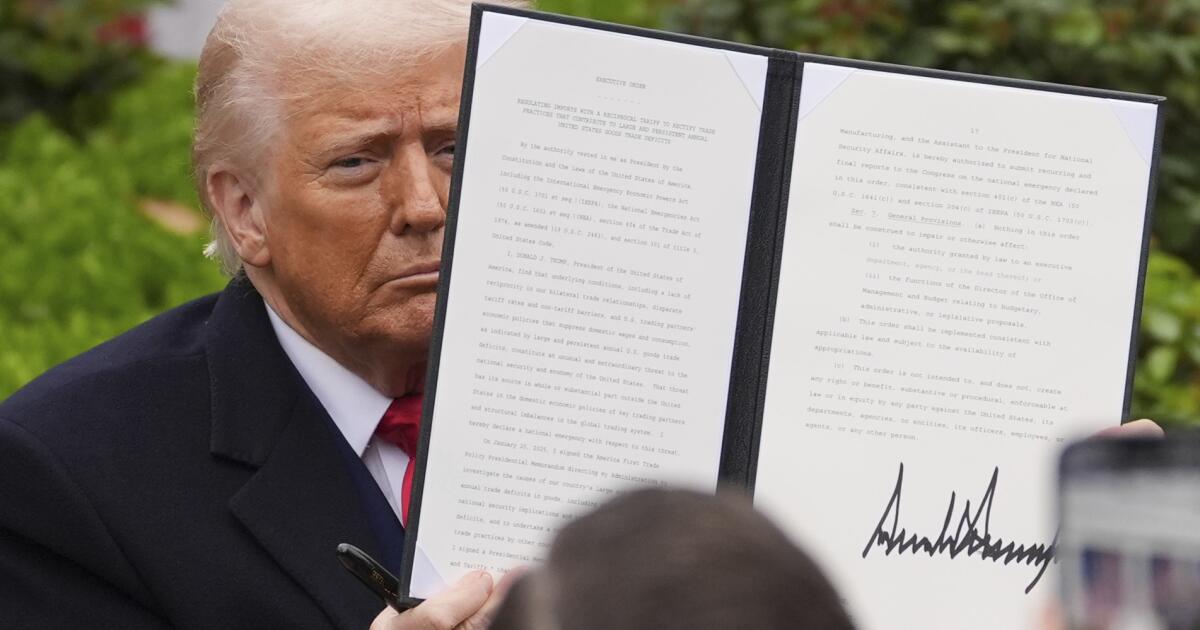UBS Lowers S&P 500 Target Amid Ongoing Market Volatility Following Trump Tariff Announcements
UBS has reduced its S&P 500 target by 9% as market volatility persists after significant tariffs announced by President Trump.

Tax-loss harvesting could be attractive with the S&P 500 Index still down more than 15% from an all-time high in February as of midday Tuesday.
This tax strategy is a 'silver lining' amid tariff volatility, advisor says. Here's how to use it
 CNBC·11d·ReliableThis source consistently reports facts with minimal bias, demonstrating high-quality journalism and accuracy.CenterThis outlet is balanced or reflects centrist views.
CNBC·11d·ReliableThis source consistently reports facts with minimal bias, demonstrating high-quality journalism and accuracy.CenterThis outlet is balanced or reflects centrist views.
U.S Stocks headed toward their biggest gain since November and bonds fell after Treasury Secretary Scott Bessent fueled hopes of trade deals, marking a dramatic shift in Wall Street sentiment following a selloff that chopped trillions of dollars off global markets.
Intelligence: Stocks Rally, Bonds Slip on Trade Deal Hopes
 Bloomberg·11d·ReliableThis source consistently reports facts with minimal bias, demonstrating high-quality journalism and accuracy.CenterThis outlet is balanced or reflects centrist views.
Bloomberg·11d·ReliableThis source consistently reports facts with minimal bias, demonstrating high-quality journalism and accuracy.CenterThis outlet is balanced or reflects centrist views.
Even though the 60/40 portfolio has had some bad single-year performances – it got hammered in 2022, for example – over time, it has offered a lot of ballast for investors.
What to do if the stock market’s big drop is getting to you | Business
 CNN·11d·ReliableThis source consistently reports facts with minimal bias, demonstrating high-quality journalism and accuracy.Leans LeftThis outlet slightly leans left.
CNN·11d·ReliableThis source consistently reports facts with minimal bias, demonstrating high-quality journalism and accuracy.Leans LeftThis outlet slightly leans left.
In the wake of Trump’s announcement last week that the U.S. would impose a 10 percent baseline tariff on nearly all foreign trading partners — plus additional higher tariffs for several countries — the stock market has faced significant dips and concern over the economy has surged.
Ackman doubles down on pause: Thoughts on Trump tariffs ‘misinterpreted’
 The Hill·11d·ReliableThis source consistently reports facts with minimal bias, demonstrating high-quality journalism and accuracy.CenterThis outlet is balanced or reflects centrist views.
The Hill·11d·ReliableThis source consistently reports facts with minimal bias, demonstrating high-quality journalism and accuracy.CenterThis outlet is balanced or reflects centrist views.
Tuesday's rebound could also be due to investors seeking to buy stocks after they'd been knocked down, seizing the opportunity to buy shares at lower costs, some analysts noted.
Stocks rebound as Treasury chief Bessent says tariff negotiations could bring "good deals"
 CBS News·11d·ReliableThis source consistently reports facts with minimal bias, demonstrating high-quality journalism and accuracy.CenterThis outlet is balanced or reflects centrist views.
CBS News·11d·ReliableThis source consistently reports facts with minimal bias, demonstrating high-quality journalism and accuracy.CenterThis outlet is balanced or reflects centrist views.
However, many economists have issued warnings that the administration's trade policies could push the U.S. closer toward this possibility.
Donald Trump senior aide says "I guarantee no recession"
 Newsweek·11d·Mostly ReliableThis source is generally reliable but sometimes includes opinion, propaganda, or minor inaccuracies.CenterThis outlet is balanced or reflects centrist views.
Newsweek·11d·Mostly ReliableThis source is generally reliable but sometimes includes opinion, propaganda, or minor inaccuracies.CenterThis outlet is balanced or reflects centrist views.
Despite the positive market predictions, global conflicts or products of the rumor mill could shake the stock floors, as evidenced by Monday’s seesawing stock market.
Dow jumps 1,300 points at open, rebounding amid China tariff tension
 NewsNation·11d·ReliableThis source consistently reports facts with minimal bias, demonstrating high-quality journalism and accuracy.CenterThis outlet is balanced or reflects centrist views.
NewsNation·11d·ReliableThis source consistently reports facts with minimal bias, demonstrating high-quality journalism and accuracy.CenterThis outlet is balanced or reflects centrist views.
The S&P 500 rose 3.3%, and Nasdaq 100 futures jumped 3.6% following reports of negotiations across multiple countries and possible concessions from major trade partners.
US stocks jump as trading partners rush to negotiate with Trump on tariffs
 New York Post·11d·Mostly ReliableThis source is generally reliable but sometimes includes opinion, propaganda, or minor inaccuracies.Leans RightThis outlet slightly leans right.
New York Post·11d·Mostly ReliableThis source is generally reliable but sometimes includes opinion, propaganda, or minor inaccuracies.Leans RightThis outlet slightly leans right.
Despite some of the rebounds, there remains a heightened level of uncertainty among investors in Asia.
Reeves tries to soothe market jitters after sell-off driven by Trump tariffs
 The Guardian·11d·ReliableThis source consistently reports facts with minimal bias, demonstrating high-quality journalism and accuracy.Leans LeftThis outlet slightly leans left.
The Guardian·11d·ReliableThis source consistently reports facts with minimal bias, demonstrating high-quality journalism and accuracy.Leans LeftThis outlet slightly leans left.
The reasons for the bounce are idiosyncratic.
U.S. stocks open higher, but China shows no signs of bowing to Trump
 NBC News·11d·ReliableThis source consistently reports facts with minimal bias, demonstrating high-quality journalism and accuracy.CenterThis outlet is balanced or reflects centrist views.
NBC News·11d·ReliableThis source consistently reports facts with minimal bias, demonstrating high-quality journalism and accuracy.CenterThis outlet is balanced or reflects centrist views.
Though the United States avoided a direct repeat of 1987’s Black Monday, the market will likely remain highly volatile for the rest of the week.
Stock market swings in wild Monday on Wall Street - Washington Examiner
 Washington Examiner·11d·Mostly ReliableThis source is generally reliable but sometimes includes opinion, propaganda, or minor inaccuracies.Leans RightThis outlet slightly leans right.
Washington Examiner·11d·Mostly ReliableThis source is generally reliable but sometimes includes opinion, propaganda, or minor inaccuracies.Leans RightThis outlet slightly leans right.
The market itself — if one dares to vest it with a mind of its own — doesn’t know what to make of Trump’s tariff policies.
 Los Angeles Times·11d·ReliableThis source consistently reports facts with minimal bias, demonstrating high-quality journalism and accuracy.Leans LeftThis outlet slightly leans left.
Los Angeles Times·11d·ReliableThis source consistently reports facts with minimal bias, demonstrating high-quality journalism and accuracy.Leans LeftThis outlet slightly leans left.
Summary
U.S. markets are attempting recovery with stocks up over 3% after President Trump's tariff announcements, although concerns about trade tensions, especially with China, persist. UBS recently cut its year-end target for the S&P 500 to 5,800, reflecting weak market sentiment and expectations of GDP growth below 1%. David Lefkowitz, head of U.S. equities at UBS, commented on the surprising aggressiveness of the tariffs and the likelihood of future negotiations. The Dow gained nearly 1,400 points recently, but experts warn that the bounce is a classic bear market rebound, with more downside expected as earnings season approaches amid ongoing tariff uncertainty.
Perspectives
Investors are advised to remain patient during market volatility, as historical patterns suggest recovery will eventually follow significant downturns.
Selling stocks during major sell-offs can lead to losing out on substantial gains in recovery periods; missing just a few of the market's best days can dramatically reduce investment returns.
Long-term perspectives and adjusting risk assessments based on individual timelines are key for successful investing, especially during uncertain times.
FAQs
No FAQs available for this story.
History
- 11d
- 11d